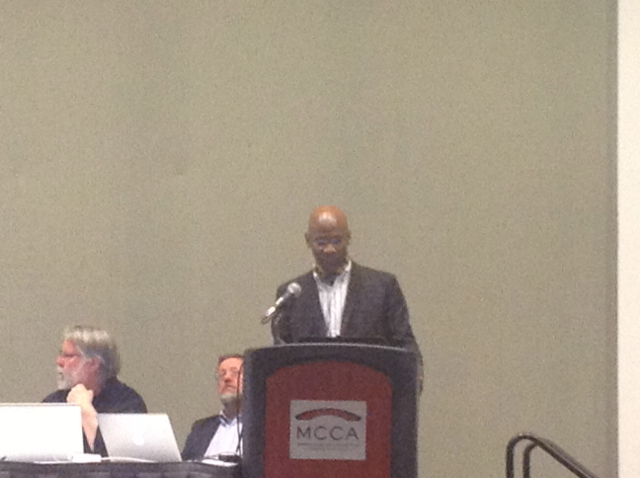24.954 Pragmatics in Linguistic Theory
Instructors: Kai von Fintel and Irene Heim
Wednesday and Friday 10-11:30a, 32-D461
http://stellar.mit.edu/S/course/24/sp13/24.954/
This intermediate level class will explore basic concepts and tools in five areas of linguistic pragmatics:
1. presuppositions
2. implicatures
3. indexicality
4. speech acts
5. focus
Throughout, we will provide pointers to current work on these topics.
The class presupposes familiarity with compositional intensional semantics, as developed in our introductory sequence (24.970, 24.973).
Students who take the class for credit are expected to attend class diligently, to do all required advance readings, to participate vigorously in class discussion, to submit occasionally assigned homework exercises, and to submit a final term paper on a topic related to the class.
24.956 Topics in Syntax
Uttering theory: topics in the relation between syntax and phonology
Instructor: Norvin Richards
Wednesday 12-3p, Room 32-D461
http://stellar.mit.edu/S/course/24/sp13/24.956/
Current Minimalist theories posit a number of parametric differences between
languages, which amount to stipulating the distributions of various types of
overt movement. In this class we will spend the semester exploring the idea
that we can reach deeper explanations for syntactic phenomena like these by
allowing the syntax to make more reference to phonology thatn we are used to.
I’ll argue for universal conditions on the phonological consequences of certain
kinds of syntactic relations, and claim that some of the operations performed
by the syntax (movement operations, in particular) are driven by the need to
meet these universal conditions. In the end, the relevant parametric
differences between languages will be independently necessary phonological and
morphological ones, having to do with stress, prosody, and the distribution of
various types of affixes.
The resulting theory will account for the distribution of overt wh-movement (in
single wh-questions), EPP effects, and head-movement in a number of languages.
Time permitting, we will go on to consider phenomena like scrambling and DP
structure, and develop new answers to a variety of traditional and
not-so-traditional questions (why is PRO always null? why are ergative
languages with fixed word order typically either SOV or verb-initial? why do
some languages, but not others, allow nominative subjects in infinitives
(Szabolcsi 2007)? why can languages like Chichewa optionally leave wh in situ
in all positions except for preverbal subjects, which must overtly move via
clefting? why is extraposition to the right of the verb in German possible
just when the VP has been topicalized (Haider’s puzzle)?). We’ll also discuss
the consequences of the approach for the architecture of the grammar.
Registered students will be asked to do in-class presentations (either of
relevant readings or of the student’s own research), and to hand in a (possibly
very rough draft of a) final paper.
24.964 Topics in Morpho-Phonology
The analysis of cyclic and and pseudo-cyclic phenomena
Instructors: Donca Steriade, David Pesetsky
Mondays 2-5, 32-D461
http://stellar.mit.edu/S/course/24/sp13/24.964/
Full syllabus is available here. (pdf)
In these lectures, we propose to explore some well-known problems in the functioning of the
phonological cycle; to examine and debate some solutions. We will also document and solve some
less well-known problems that bear some resemblance to the cycle. A central topic will be a
proposed unified view of all cyclic-like interactions in phonology, based on recent work. A related
important goal of the class will be the clarification or elimination (not yet sure which) of differences
between cyclic computations, as motivated in phonology, and cyclic spell-out in syntax.
This is a collaborative venture. The two instructors will take turns proposing alternative solutions
to problems laid out. Exercises will be designed to give a chance to all participants to engage in the
debate. After completion, the problems will be discussed in class.
24.979 Topics in Semantics
“Free Relatives, Free Choice”
Instructors: Kai von Fintel, Sabine Iatridou
Mondays 10-1, 32D-461
http://stellar.mit.edu/S/course/24/sp13/24.979/
This semester, we will explore the syntax and semantics of free relative constructions and of free choice expressions.

